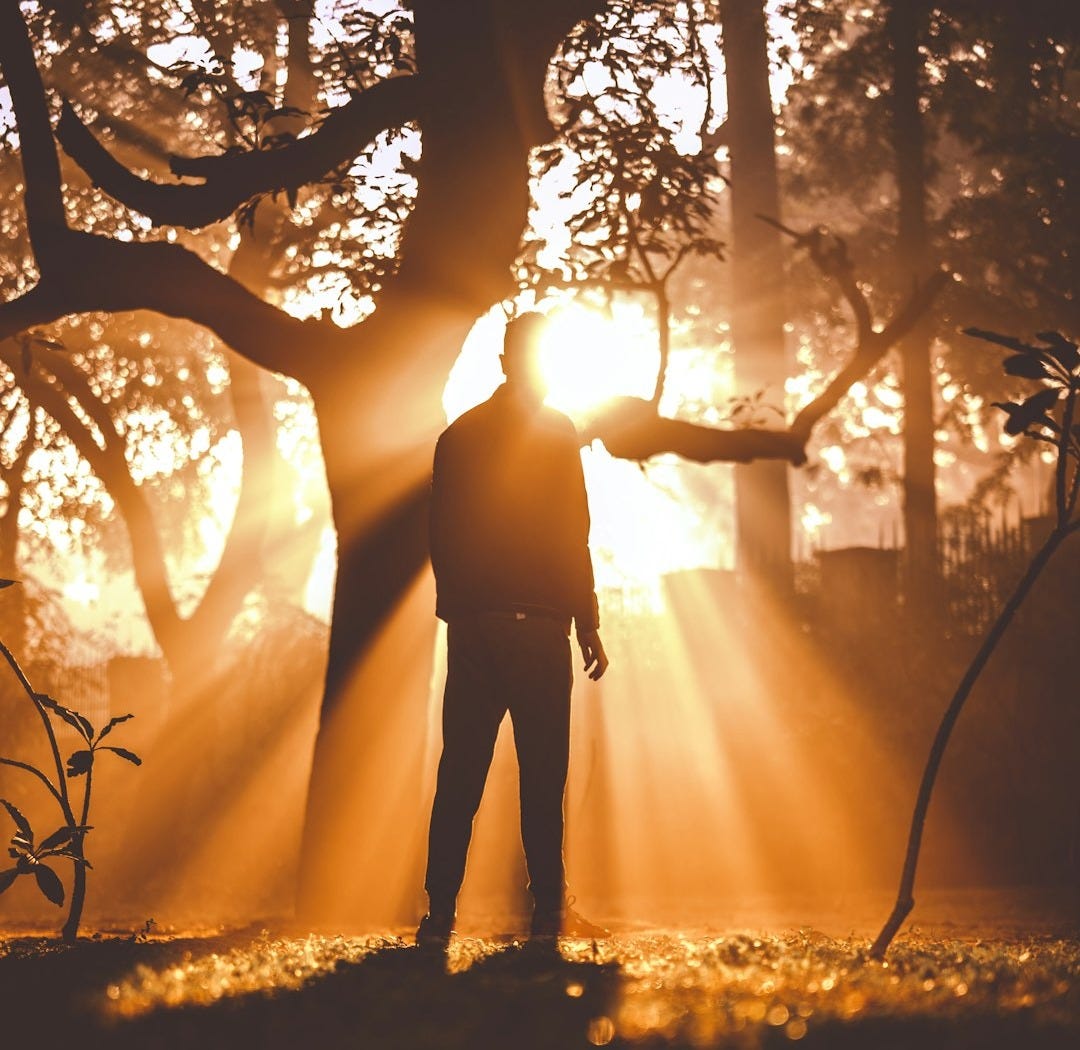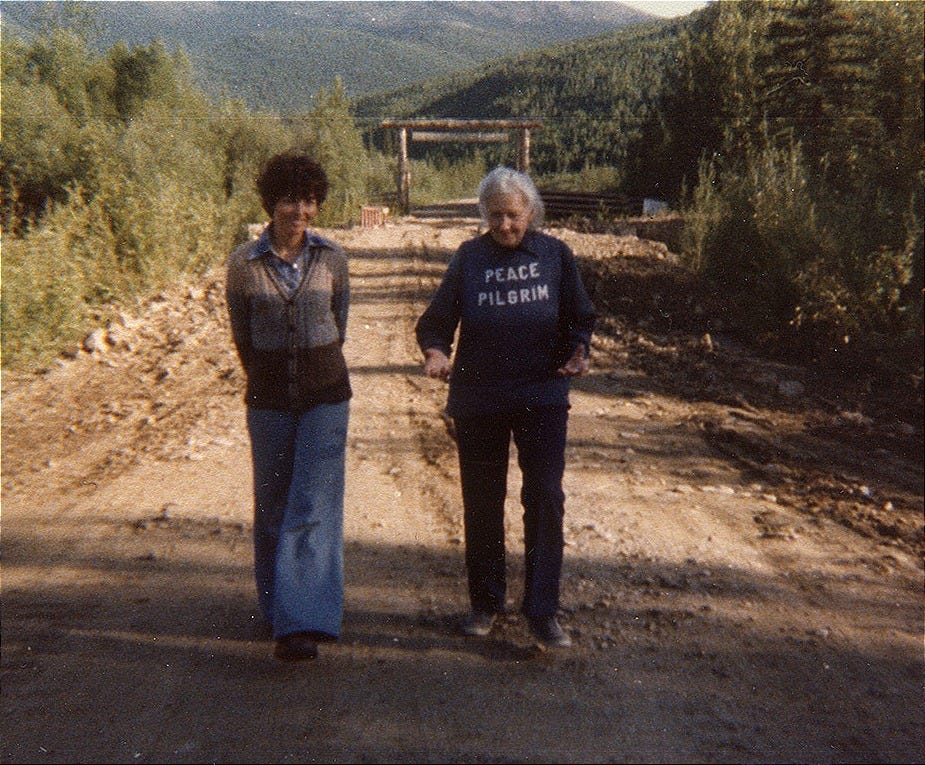Literary examples of the final transition into divine union (or not), Part 1
Tragic and heroic character arcs at the very end of the soul's journey
(If you like this post, selecting the ❤️ to bless the Algorithm Angels.)
In the series of posts on the transition between the self-sacrificer and the self-transcender, we explored a variety of steps that help one become an every-clearer channel for God’s grace. The breadth of those steps implies that the self-transcender pattern itself is a spectrum—as are all the patterns—with the final state being union with God wherein the permanent fulfillment of Satchidananda that one has always sought is finally realized. This is, in a sense, the final transition whereby one rises beyond the behavioral patterns altogether.

But this transition is never automatic. God is no tyrant and does not force any soul to leave self-identity behind for all eternity.1 That step must be taken willingly—that is, there’s a decision involved—and thus offers the possibility for literary exploration through both tragic and heroic character arcs. The tragic again being when a protagonist turns away, the heroic being when the protagonist courageously delves into the Infinite. We’ll look at several examples, two accounts taken from memoirs here in part 1, then a few examples from fiction in part 2.
Peace Pilgrim’s “Attainment of Inner Peace”
In Peace Pilgrim: Her Life and Work in Her Own Words, she describes her first experience with mystical oneness:
I was out walking in the early morning. All of a sudden I felt very uplifted, more uplifted than I had ever been. I remember I knew timelessness and spacelessness and lightness. I did not seem to be walking on the earth. There were no people or even animals around, but every flower, every bush, every tree seemed to wear a halo. There was a light emanation around everything and flecks of gold fell like slanted rain through the air. …
The most important part of it was not the phenomena [but] the realization of the oneness of all creation. Not only all human beings—I knew before that all human beings are one. But now I knew also a oneness with the rest of creation. The creatures that walk the earth and the growing things of the earth.The air, the water, the earth itself. And, most wonderful of all, a oneness with that which permeates all and binds all together and gives life to all. A oneness with that which many would call God.
I have never felt separate since. I could return again and again to this wonderful mountaintop, and then I could stay there for longer and longer periods of time and just slip out occasionally. (21)
She finally reached a point of simple understanding expressed in this “thought to God”:
“It seems to me that if I could always remain in harmony I could be of greater usefulness—for every time I slip out of harmony it impairs my usefulness.” (22)
This is exactly a statement that says, “I choose harmony because it makes me a better channel for grace.”
After that, she said,
I knew that I would never need to descend again into the valley. I knew that for me the struggle was over, that finally I had succeeded in giving my life or finding inner peace. Again this is a point of no return. You can never go back into the struggle. The struggle is over now because you will to do the right thing and you don’t need to be pushed into it. (22)
Nor did she feel the need to push on the world to achieve some outcome—it was enough to simply be a channel for peace, which is what she means by being “useful.”
When you become a channel through which God works there are no more limitations, because God does the work through you: you are merely the instrument—and what God can do is unlimited. When you are working for God you do not find yourself striving and straining. You find yourself calm, serene and unhurried. (26)
That’s why she was content with undertaking her wandering pilgrimage, not knowing where she’d sleep, not knowing when she’d eat, not worrying about how anyone else would respond. She simply became peace and walked prayerfully in that consciousness for the rest of her life, letting people approach her rather than trying to approach them.
The tragic choice of Alan Lightman
Whereas Peace Pilgrim accepted her experience and followed the heroic arc of the self-transcender, the physicist Alan Lightman, in his book, Probable Impossibilities (Vintage Books, 2022), offers a personal example of turning away from an invitation to rise—the tragic arc. The book as a whole is not a memoir, but this particular section from the chapter, “On Nothingness,” is of that nature.
It was a Sunday afternoon when he was nine-years old when Lightman had a “most vivid encounter with nothingness”:
I was standing alone in a bedroom of my home in Memphis, Tennessee, gazing out the windows at the empty street, listening to the faint sound of a train passing a great distance away, and suddenly I felt that I was looking at myself from outside my body. For a brief few moments, I had the sensation of seeing my entire life, and indeed the life of the entire planet, as a brief flicker in the vast chasm of time, with an infinite span of time before my existence and an infinite span of time afterward. My fleeing sensation included infinite space. Without body or mind, I was somehow floating in the gargantuan stretch of space, far beyond the solar system and even the galaxy, space that stretched on and on and on. (38-39)
He’s clearly having an experience of “cosmic consciousness,” a state we explored in Three literary accounts of mystical union, Part 1 and Part 2, the latter of which includes Paramhansa Yogananda’s account in Autobiography of a Yogi. Many spiritual seekers consider reaching this state of non-physical awareness among their highest aspirations.
Lightman, though, took a negative view. Instead of transcending his small self, the ego, he referred the experience back to ego and dragged it into nihilism rather than divinity:
I felt myself to be a tiny speck, insignificant. A speck in a huge universe that cared nothing about me or any living beings and their little dots of existence. A universe that simply was. And I felt that everything I had experienced in my young life, the joy and the sadness, and everything that I would later experience, meant absolutely nothing in the grand scheme of things. It was a realization both liberating and terrifying at once. Then the moment was over, and I was back in my body. (39)
Lightman, in short, proclaimed his ego as the only worthwhile reality rather than considering that this sense of insignificance might itself have a greater significance. Furthermore, his conclusion that the universe was essentially unconscious (that is, mechanical) and that he “meant absolutely nothing in the grand scheme of things” doesn’t align with other accounts of such experience.
In his poem Samadhi, for example (again see Three literary accounts of mystical union, Part 2) Yogananda writes, “The sparrow, each grain of sand, fall not without my sight,” echoing Jesus’ words in Matthew 10:29-31.2 Similarly, the character of Ellie Arroway in the movie version of Carl Sagan’s Contact, which we discussed in Genuine spirituality in fiction, part 4, delivers the following lines during her impassioned testimony before Congress:
I was given something wonderful, something that changed me forever—a vision of the universe that tells us undeniably how tiny and insignificant and how rare and precious we all are. A vision that tells us that we belong to something that is greater than ourselves, that we are not—that none of us—are alone!
But Lightman, like the skeptics in Contact, decides that it was all unreal and therefore worthless:
The strange hallucination lasted only a minute or so. I have never experienced it since. (39)
He goes on to justify his position by again referring back to the wholly materialistic view of consciousness, brushing away the most obvious fact of his non-material existence during that experience (the first aspect of Satchidananda) and that his experience of “nothingness” was yet conscious (the second aspect of Satchidananda):
Although nothingness would seem to exclude awareness along with everything else, awareness was part of that childhood experience, but not the usual awareness I would locate within the three pounds of gray matter in my head. It was a different kind of awareness. I am not religious, and I do not believe in the supernatural. I do not think for a minute that my mind actually left my body. But for a few moments I did experience a profound absence of the familiar surroundings and thoughts we create to anchor our lives. It was a kind of nothingness. Perhaps not Pascal’s nothingness, but a personally experienced nothingness. (39-40)
Honestly, I pity Lightman for having squandered such an opportunity to transcend himself. So far as a self-transcender is concerned, his is certainly a tragic arc.
The heroic arc of Lisa in The Land of Golden Sunshine
A similar opportunity—which this time ends heroically—is found in the poetic parable by J. Donald Walters called The Land of Golden Sunshine: An Allegory of Soul Yearning. The protagonist, Lisa, is a young factory worker in a dismal city of little happiness. Since her mother’s death, she lives alone in a poor attic room that at least allows a shaft of sunlight to occasionally enter.
It’s in that room and through the sunlight that she thrice encounters a being she calls the Sun-Man, representative of God’s light and joy. With the first two visits, she is unable to bear the Sun-Man’s presence. When he appears a third time, he says:
“I have asked so many,” he said.
“Almost all have refused!
Will you, too,
With burdened heart,
Turn back to your cold,
Unfeeling city?
Is the power of Love too great
For your weak heart, also, to bear?”
Clearly, the Sun-Man is offering Lisa the choice of final self-transcendence or turning away from that greater reality. Again, she has twice been unable to withstand the Sun-Man’s presence, and, for a short time during this third encounter, Lisa struggles with the sense of duty to her work and to the others in the factory. But then she comes to a realization that reflects Jesus’ highest commandment, to love God with all one’s heart, mind, soul, and strength:
And what was her highest duty—
If not to Love itself?“I love thee!” she whispered.
“Let all that I know and am be drowned
In the ocean of pure love!“I am not afraid.
Love only is life.
Without love,
All else is death!”
And thus she is able to offer herself wholly and finally:
The sunlight,
Stealing once more—
Slowly, across the floor,
Enveloped her once again
In a blaze of glory.But this time she welcomed it:
The more so because it encircled also him.
She knew now that she
Belonged to that light,
And that light, to her—
That whatever was outside of it
No longer pertained to her.Fearlessly she gazed
Into the full brilliance.And the shaft of light
Moved on slowly—
Across the empty room.
We’ll continue in Part 2 with a few more fictional examples.
(If you like this post, selecting the ❤️ to bless the Algorithm Angels.)
Even in this state, individuality is retained in the form of memory.
“Are not two sparrows sold for a farthing? and one of them shall not fall on the ground without your Father. But the very hairs of your head are all numbered. Fear ye not therefore, ye are of more value than many sparrows.” (KJV)



